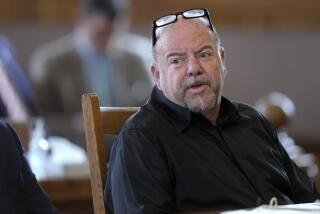Campaign hang-ups
OVER THE LAST few weeks, Iâve received phone calls from my congressional representative, one senator, a former governor and about a dozen other political heavyweights. I am neither a professional politician nor a kingmaker. I just happen to be a registered voter with a phone.
These political bigwigs were so eager to reach me that they called day and evening. When I wasnât home, they always left a message on my answering machine, but no one included a callback number. Thatâs a shame. I might have enjoyed a conversation with some of these people. Many of them make decisions that affect me every day. But even when I was home to answer the phone, the calls were distinctly one-sided: They were recorded messages urging me to vote for particular candidates.
No doubt some consultants have collected a lot of money to assure people running for office that prerecorded communications are effective. Although everyone I know hangs up the second the taped spiel starts, maybe a few people really do listen to the entire message and follow the voting instructions. But then, maybe a few people also preferred New Coke.
Candidates who use recorded campaign messages must assume that Americans are easily swayed. I canât speak for the more than 142 million registered voters in this country, but my vote canât be influenced by a machine, either political or telephonic. Let me rephrase that: My vote canât be favorably influenced by a machine. I do maintain a certain bias against candidates who annoy me with junk phone calls.
Three years ago, along with millions of other Americans, I added my phone number to the Federal Trade Commissionâs âdo not callâ registry. That move has reduced the number of calls at the dinner hour to near zero. We can now be fairly certain of getting through the evening meal without enduring an attempt to pitch insurance, magazine subscriptions, cemetery plots or countless other goods and services that I would never consider buying from a telephone sales rep.
When the system was established, an exception was granted for political messages, ostensibly because the law is limited to commercial speech and political discourse has 1st Amendment protections.
Somehow itâs not surprising that the politicians who crafted the rules exempted themselves. Our elected officials often seem to operate under standards different from those that apply to ordinary people. Could you list a $623 popcorn machine on your expense account? According to The Hill, a newspaper that covers our national legislature, one congressman paid for that important piece of office equipment last year from his âmember representational account,â the congressional equivalent of an expense account.
But I digress. Because politicians make the rules, itâs highly unlikely that they would outlaw unsolicited calls from their own ranks. I really donât have a problem with the âdo not callâ exemption granted to politicos. If any official (elected or wannabe) wishes to phone me, Iâd be happy to engage in a discussion of the issues facing the country or my neighborhood. Iâm perfectly willing to talk with candidates about policy questions, whether or not I agree with the positions theyâve taken. In other words, Iâd love to have a dialogue with them.
I expect my phone to ring frequently in the days remaining before the Nov. 7 election. So I hereby extend an open invitation to my senators, my congressional representative and candidates for any office in my area to call me. You already have my phone number. But be prepared to talk with me, not to me. If I pick up the phone and hear your recorded voice, Iâll hang up -- just as I hung up on the guy selling cemetery plots.
More to Read
Get the L.A. Times Politics newsletter
Deeply reported insights into legislation, politics and policy from Sacramento, Washington and beyond. In your inbox three times per week.
You may occasionally receive promotional content from the Los Angeles Times.










